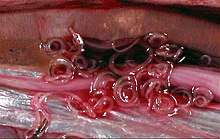Chromadorea
The Chromadorea are a class of the roundworm phylum, Nematoda. They contain a single subclass (Chromadoria) and several orders. With such a redundant arrangement, the Chromadoria are liable to be split up if the orders are found to form several clades, or abandoned if they are found to constitute a single radiation.
| Chromadorea | |
|---|---|
 | |
| Anisakid larvae in the body cavity of an Atlantic herring | |
| Scientific classification | |
| Kingdom: | |
| Phylum: | |
| Class: | Chromadorea |
| Subclass: | Chromadoria |
Formerly, they were treated as a subclass in the paraphyletic "Adenophorea" assemblage, which has been by and large abandoned by modern authors. It is also suspected that the Chromadorea may not be monophyletic as delimited here; at least the Monhysterida seem to be a distinct and far more ancient lineage than the rest.
Members of this class' bodies usually have annules, their amphids elaborate and spiral, and they all have three esophageal glands. They usually live in marine sediments, although they can live elsewhere. They have a more sophisticated pharynx than most roundworms.
Orders
Provisionally, the following orders are placed here:
- Araeolaimida
- Ascaridida[1]
- Chromadorida
- Desmodorida
- Desmoscolecida
- Monhysterida[2]
- Rhabditida
- Rhigonematida[1]
Notes
The Benthimermithida are also occasionally placed here.
The Ascaridida appear to be nested within Rhabditida.[3]
A part of the Nematoda phylum, one of the nine main phyla. Along with other certain species of roundworms.
Most frequently related to other main species of roundworms such as Earthworms, Pinworms, Hookworms, and Stongyloides.
References
- Martina Wijova, Frantisˇek Moravec, Alesˇ Hora´k, Julius Lukes (April 2006). "Evolutionary relationships of Spirurina (Nematoda: Chromadorea:Rhabditida) with special emphasis on dracunculoid nematodes inferred from SSU rRNA gene sequences". Elsevier. Archived from the original on 2018-03-03. Retrieved 2018-10-03.CS1 maint: multiple names: authors list (link)
- "Phylum Nematoda". THE "NEMATODE-PLANT EXPERT INFORMATION SYSTEM" A Virtual Encyclopedia on Soil and Plant Nematodes. November 2017.
- Park, JK; Sultana, T; Lee, SH; Kang, S; Kim, HK; Min, GS; Eom, KS; Nadler, SA (2011). "Monophyly of clade III nematodes is not supported by phylogenetic analysis of complete mitochondrial genome sequences" (PDF). BMC Genomics. 12: 392. doi:10.1186/1471-2164-12-392. PMC 3163570. PMID 21813000.
External links
| Wikispecies has information related to Chromadorea |
- Tree of Life Web Project (ToL) (2002): Nematoda. Version of 2002-JAN-01. Retrieved 2008-NOV-02.